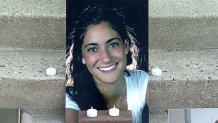Like he does every morning, Joe Samaha will begin his day on Friday by kissing a photograph of his daughter. Then, he and his wife will drive to Virginia Tech to mark the 10th anniversary of her death.
Reema Samaha was sitting in a French class the morning of Monday, April 16, 2007 when a fellow student burst through the door and opened fire.
Reema Samaha, an avid dancer and actor from Centreville, Virginia, was just 18 years old.
In the days before the 10th anniversary of the Virginia Tech massacre, her parents said they still struggle every day with the loss of their daughter.
"Our journey keeps going. It doesn't end," Joe Samaha said.
"One year or 10 years, they're just as painful," his wife added.

Ten years after a mentally ill man armed with two semi-automatic pistols opened fire at Virginia Tech, victims and their families say they are still healing and working to prevent future mass shootings.
Local
Washington, D.C., Maryland and Virginia local news, events and information
The day Reema Samaha died, Seung-Hui Cho killed a total of 32 students and faculty members and then killed himself.
He killed two students in the dormitory Ambler Johnston Hall about 7:15 a.m.
More than two hours later, he entered Norris Hall, a building where classes are held, and stalked through the hallways with the guns. Victims were found wounded and dead in four classrooms and a stairwell.
As first-responders rushed into the building, students' cellphones rang and rang with calls from loved ones trying to find out if they were safe, Virginia Sen. Tim Kaine recalled. He was the state's governor.
"Bodies were littering the floor, and next to every body was a cellphone just ringing over and over again," Kaine said.
Two Approaches to Coping With Grief
Joe and Mona Samaha said they have dealt with their grief in two separate ways over the years: she turned inward, and he turned to politics.

Mona Samaha said the murder of her daughter, the youngest of three children, challenged her Christian faith.
"My whole understanding about life and prayer were shaken. I needed to go back and find, why am I living? Where was God when Reema was killed? I prayed every day. Why does he not listen to my prayer?" she said.
As Mona Samaha struggled with fear, anxiety and depression, she prayed and kept a journal. After five years had passed since the college freshman was killed, Mona Samaha wrote in her journal, "I am free, Reema is free."
After 10 years, she said she has a new understanding of love.
"We are living to experience God's love and to share it among each other," she said.
Joe Samaha initially focused his efforts on gun law reform.
The shooter, Cho, legally bought the two guns he used in the massacre. A judge had found he was a danger to himself and ordered him to get outpatient mental health treatment. But he passed two background checks because state law at the time only required that those committed to mental hospitals be reported to the FBI.
Kaine was able to change the law by issuing an executive order that later won bipartisan support. But other measures, including for background checks to be performed at gun shows, failed.
Joe Samaha pressured lawmakers, often with his daughter's photo in hand, but was frustrated by the political process. He turned to working on campus safety measures instead.
He is president of the Virginia Tech Victims' Family Outreach Foundation, a nonprofit that works to prevent school shootings. The group has helped victims and survivors of other tragedies, and created a system to evaluate the safety of campuses.
PHOTOS: Virginia Tech Shooting Survivor Speaks Upon 10th Anniversary
'How Many More Tragedies Do There Have to Be?'
A decade after the massacre, families are still fighting for gun laws they say may have saved their children's lives.
Kaine told News4 he had hoped the shooting would remain the country's most shocking and prompt serious gun law reforms. It was, at the time, the deadliest mass shooting in the United States in recent history. The massacre at the Pulse nightclub in Orlando last year claimed 49 lives, surpassing the death toll at Virginia Tech.
"I don't know what it's going to take. How many more tragedies do there have to be before we wake up and say, 'We can reduce this'?" the former Virginia governor said.
Kaine said he was inspired by what shooting victim Liviu Librescu did when he heard gunshots in the hallway outside his classroom.
The 76-year-old Holocaust survivor was teaching when he heard gunfire rattle through the second floor of Norris Hall. He pushed his body against the classroom door, giving his students time to jump out of the windows. Librescu, an accomplished aeronautical engineer from Romania, died after he was shot multiple times.
Reema Samaha was one of the youngest victims of the shooting, and Librescu was the oldest.
Kaine said the hero's death troubled him.
"What does it mean that you can survive the Holocaust and you can survive the Soviets taking over your country, but you can't survive the carnage of gun violence in the United States?" he asked.
'Day of Remembrance' Will Span Several Days This Year
Events to remember the 32 students and faculty members who lost their lives will span the entire weekend this year, and alumni groups across the country also will hold ceremonies.
Musicians and dancers will perform on campus Friday, and a 3.2-mile run will be held Saturday morning.
A series of solemn events will be held on Sunday, which is Easter and the 10th anniversary itself, starting with the lighting of a ceremonial candle at midnight. The Virginia Tech Corps of Cadets will stand guard for 32 minutes, and then the candle will remain lit for 24 hours.
A moment of silence will be held at 9:43 a.m., to mark the moment when Cho began firing in Norris Hall.
A candlelight vigil, among other events, will be held at 7:30 p.m. Sunday. Then, the ceremonial candle will be extinguished at 11:59 p.m.
After a weekend full of remembrance ceremonies, Reema Samaha's father will end the day as he began it: by kissing his daughter's photo.
"She's still with us," he said.



